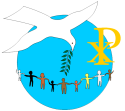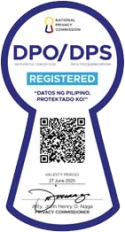Breakdown to Breakthrough: Modules on Psycho-social Support in a Changing Educational Landscape Learning Modules / E-book
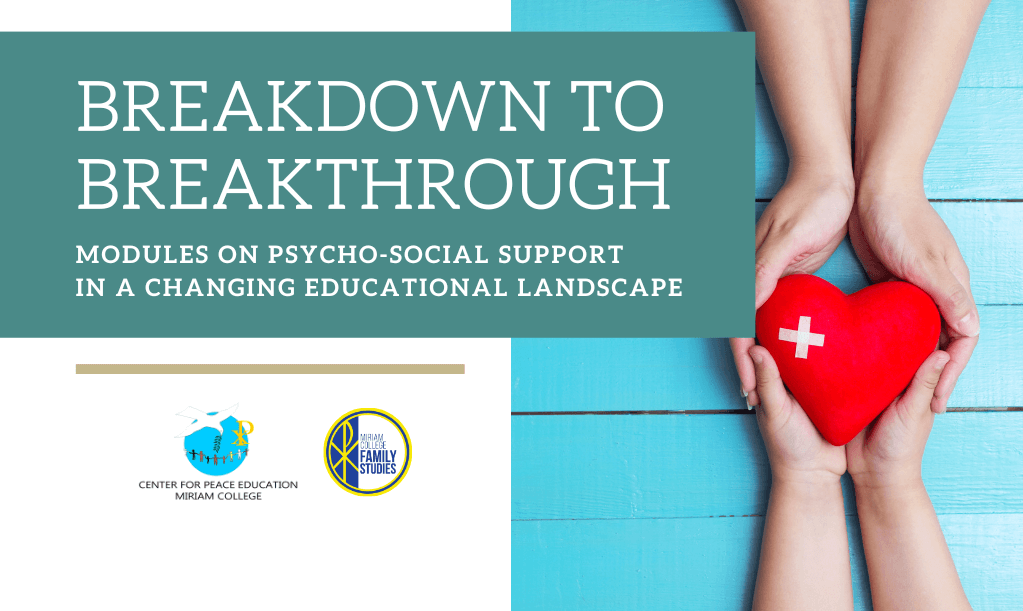
Breakdown to Breakthrough: Modules on Psycho-social Support in a Changing Educational Landscape Learning Modules / E-book
Publication Year: 2020
Though the COVID-19 pandemic is a physical health crisis, our collective experience tells us that it has the potential for a major mental health crisis if action is not taken promptly. For this reason, the Center for Peace Education and the Family Studies program of Miriam College have collaborated to bring you the "Breakdown to Breakthrough: Modules on Psycho-social Support in a Changing Educational Landscape". This learning resource was written by 13 family experts, some of which are licensed psychologists, licensed social workers, child, and adolescent key opinion leaders, and certified marital and pastoral counselors.
Official Programme: Alab ng Kapayapaan (Sparks of Peace): Women Peacekeepers in the Philippines
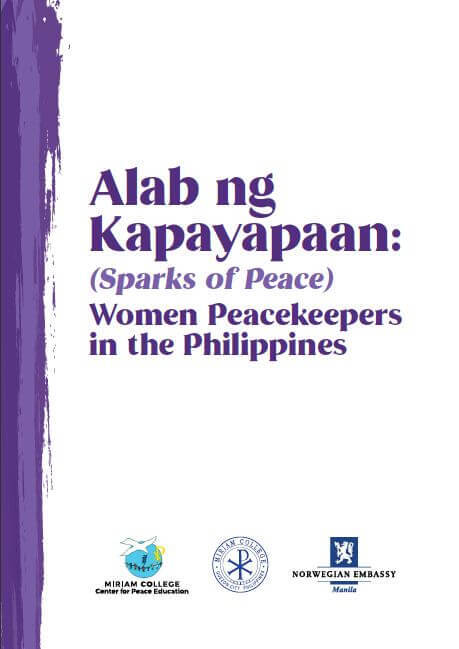
Official Programme: Alab ng Kapayapaan (Sparks of Peace): Women Peacekeepers in the Philippines
Booklet / E-Book
Alab ng Kapayapaan (Sparks of Peace): Women Peacekeepers in the Philippines" is a 2020 documentary produced by the Center for Peace Education-Miriam College, with support from the Royal Norewgian Embassy in Manila. The film documents the beginnings of the Philippines’ National Action Plan on Women, Peace and Security in 2010; women and peacebuilding at the grassroots level; and stories of the women of WePeace from Kalinga, Quezon Province, North Cotabato, and Surigao del Sur.
This official programme offers background information and guide questions to help audiences process and dive deeper into the realities and situations raised by the women in the documentary.
At the Frontline: Women Peacekeepers in the Philippines
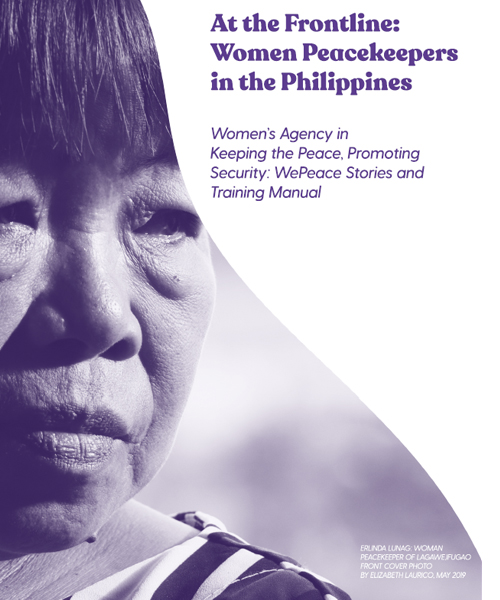
At the Frontline: Women Peacekeepers in the Philippines
Training Manual / E-Book
The Women’s Agency in Keeping the Peace, Promoting Security or WePeace is a localization project of the UNSCR 1325, Women, Peace and Security, initiated by the Center for Peace Education-Miriam College (CPE) and supported by the Royal Norwegian Embassy in Manila. It aims at sharing capacities with selected community women on gender-responsive peacemaking and peacekeeping. Through the training, the women peacekeepers of WePeace have complemented the work of community peace and order councils through monitoring and documenting incidents of conflict, raising the discussion on and encouragement of reporting gender-based violence, and mediating community conflicts.
Concluding its first year of implementation, this publication documents WePeace’s training process, community stories, and training modules from four different areas across the country.
Peace Education Training Manual For GPPAC-Southeast Asia
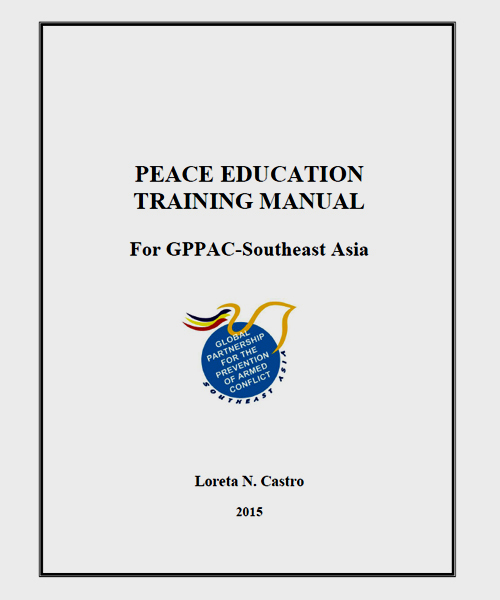
Peace Education Training Manual For GPPAC-Southeast Asia
Training Manual / E-Book
The main purpose of this training manual is to introduce the training participants to the fundamentals of Peace Education - its basic knowledge base as well as the skills and values that need to be cultivated. Inasmuch as this is only an introductory manual, it will not be able to delve deeply on the various aspects related to the field. Rather, the thrust and specific objective of this manual would be to introduce (1) a holistic understanding of peace and violence, (2) the essential purpose and key themes of peace education, (3) the attributes of a peace educator, and (4) pointers for peace advocacy.
Peace Education: A Pathway to a Culture of Peace Third Edition
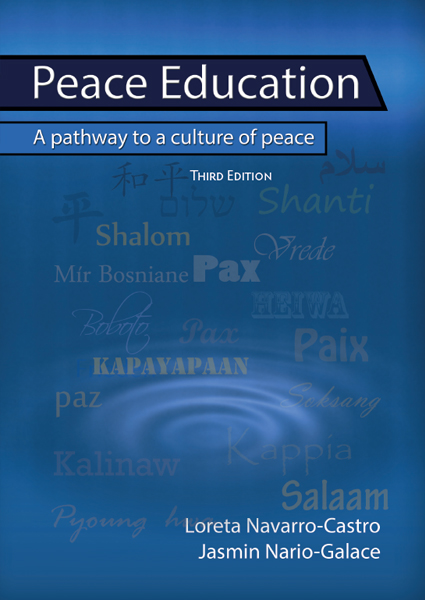
Peace Education: A Pathway to a Culture of Peace Third Edition
Year of Publication: 2019
Description: The overall goal of this book is to provide educators with the basic knowledge base as well as the skill- and value-orientations that we associate with educating for a culture of peace. Although this work is primarily directed towards the pre-service and in-service preparation of teachers in the formal school system, it may be used in nonformal education. It can also be a resource for those who want to understand peace issues and some of the ways by which they can help work for change towards a more peaceable society.
Implementing the Philippine National Action Plan on United Nations Security Council Resolutions 1325 and 1820: A Civil Society Monitoring Report
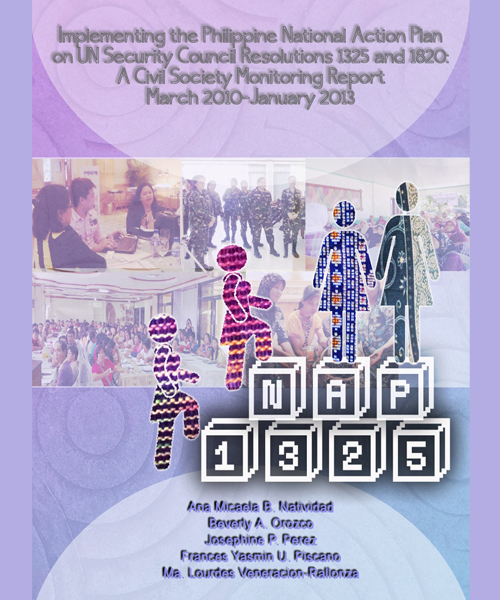
Implementing the Philippine National Action Plan on United Nations Security Council Resolutions 1325 and 1820: A Civil Society Monitoring Report
E-Book
This study looks at how far policymakers and other stakeholders have gone on addressing the needs and concerns of women in conflict affected areas three years after the launching of the National Action Plan (NAP) on UNSCR 1325 and 1820.
WE Act 1325: Six Years of Implementing the Philippine National Action Plan
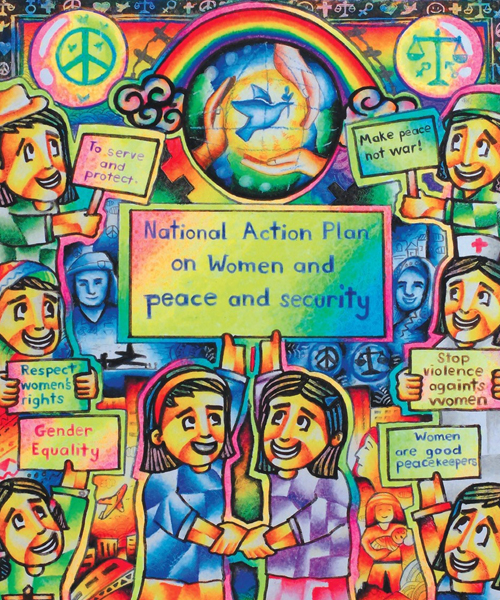
WE Act 1325: Six Years of Implementing the Philippine National Action Plan
E-Book
This publication reviews the various efforts of WE Act 1325 on the implementation of the Philippine National Action Plan on Women, Peace and Security since its launched on 2010.
Operationalising Women’s “Meaningful Participation” in the Bangsamoro: Political Participation, Security and Transitional Justice
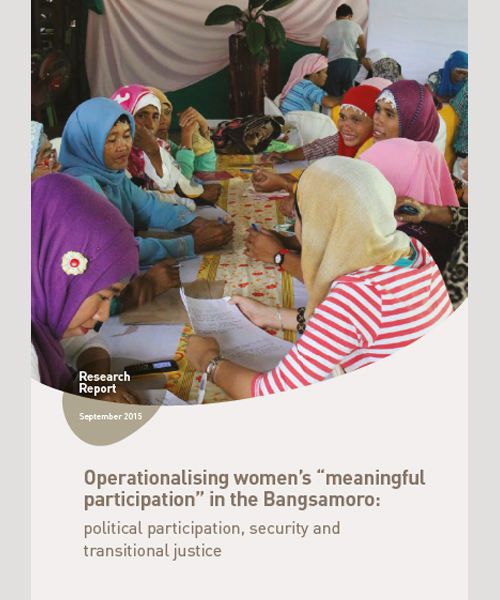
WE Act 1325: Six Years of Implementing the Philippine National Action Plan
Research Report / E-Book
This is a research report detailing the progress of four Mindanao-based civil organizations in generating women’s awareness on and operationalizing the provisions in the Framework Agreement on the Bangsamoro on women’s participation in the social, legal, and institutional levels.
Women, Peace And Security in the Autonomous Region in Muslim Mindanao: A Civil Society Report
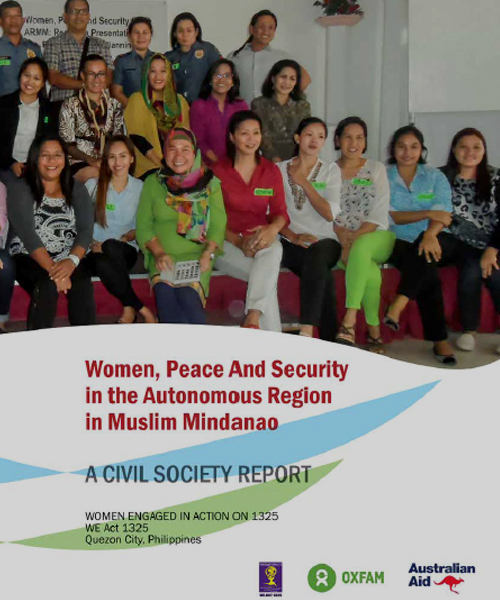
Women, Peace And Security in the Autonomous Region in Muslim Mindanao: A Civil Society Report
Report / E-Book
The study maps out the Philippines’ National Action Plan on implementing the global agenda of Women, Peace and Security, in accordance with United Nations Resolutions 1325 and 1820, in the Autonomous Region in Muslim Mindanao. Specifically, the study examines progress in the areas of policy, institutional infrastructure and institutional mechanisms.
Women Speak: Perspectives on Normalization
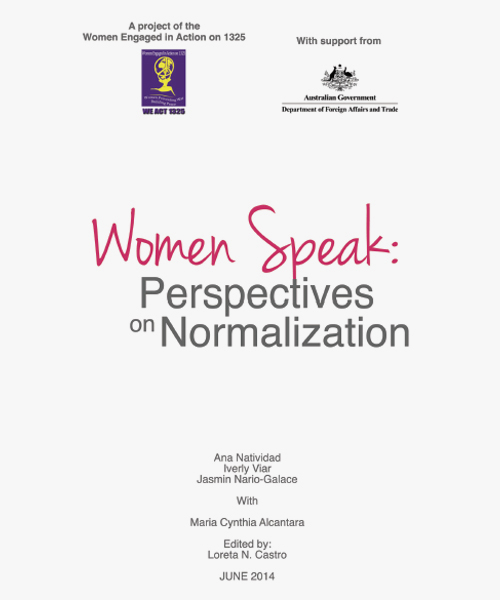
Women, Peace And Security in the Autonomous Region in Muslim Mindanao: A Civil Society Report
Report / E-Book
This report contains the perspectives shared by the women participants during the capacity-building and Focus Group Discussion components of the Project.
Women Working for Normalization
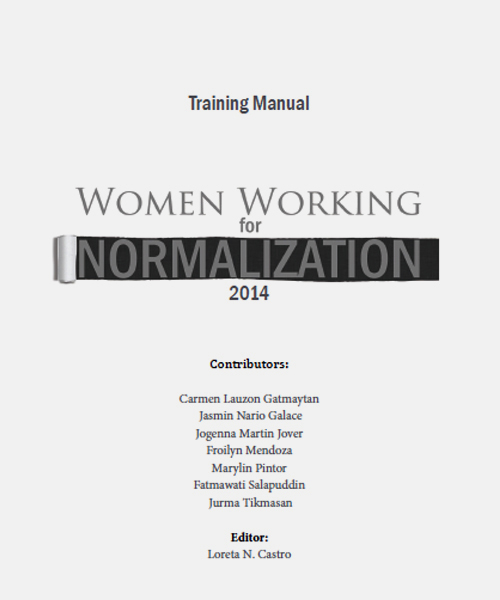
Women Working for Normalization
Training Manual / E-Book
The training manual focuses on women’s participation in the process of normalization in the Autonomous Region in Muslim Mindanao, as set out by the Framework Agreement on the Bangsamoro. Guide questions and key learning points help facilitators achieve the two-fold goal set out in the parallel publication, Women Speak: Perspectives on Normalization.
Voices from the Field: Community Women’s Perspectives on the GPH-NDF Armed Conflict Research Report
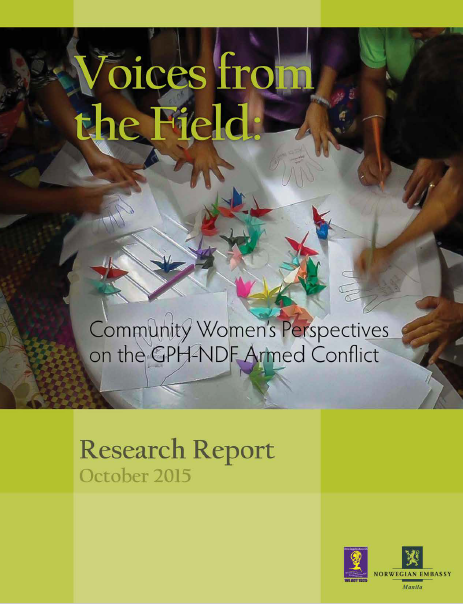
Voices from the Field: Community Women’s Perspectives on the GPH-NDF Armed Conflict Research Report
Research Report / E-Book
Conducted from March to September 2015, this research report gathers together the perspectives of community women from six conflict-affected areas (Agusan, Surigao, Misamis, Davao, Bukidnon and North Cotabato) on how they perceive the GPH-NDF conflict. It also looks into views of the women on how it affects them and how do they address the challenges brought about by the conflict.
Three Decades of Peace Education in the Philippines
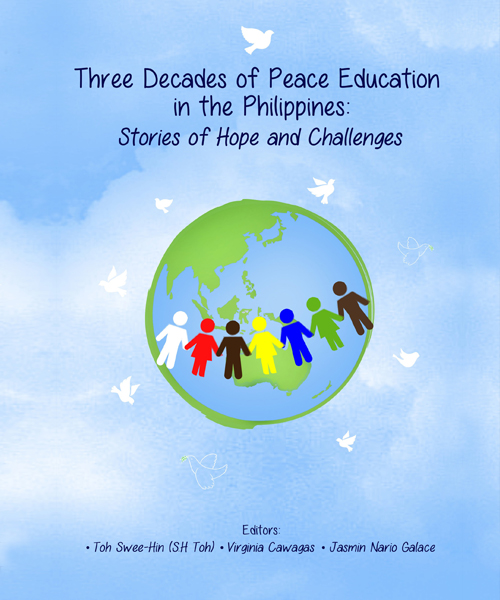
Three Decades of Peace Education in the Philippines: Stories of Hopes and Challenges
E-Book
This publication serves as a collection of stories of peace educators since the rooting of peace education in the post-EDSA revolution Philippines. The stories in this book are compiled into four sections. The first sec¬tion reflecting the theme, “Visions Crystallized, Seeds Planted” recount efforts and initiatives of peace educators in the early 1980s or even earlier. The second section is a collection of several stories of “Growing Seeds in the Edu¬cation System” in basic schools and higher education institutions. The third group of storytellers narrated their experiences and lessons in “Nurturing Peace Education: Civil Society Cultivators.” The fourth and concluding section features two stories exploring the theme “Moving Ahead, Widening the Circle.”

